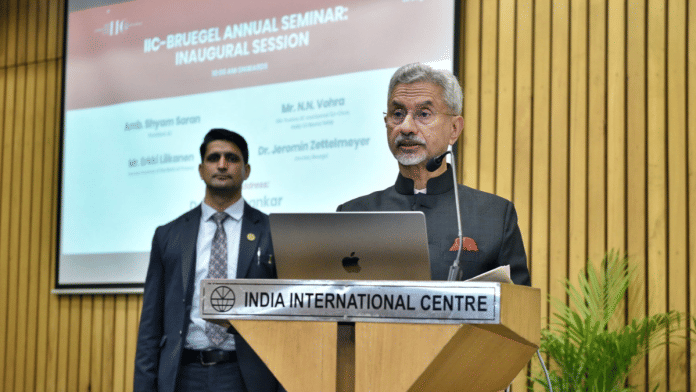New Delhi: External Affairs Minister S. Jaishankar Tuesday took potshots at western powers over what he called “convenient” and “selective” standards when it came to democracy, military dictatorships and terrorism in Pakistan and Bangladesh.
“The world is currently witnessing two major conflicts. These are often presented as matters of principle. We are told that the very future of the world order is at stake. Yet the record shows how selectively and unevenly these principles have been applied,” said Jaishankar at the second India International Centre (IIC)-Bruegel Annual Seminar.
He added: “Equally, terrorism has been overlooked when convenient. In our own continent, international law has been disregarded with significant consequences… even on a question like democracy and military rule. Different standards have been applied to our neighbours in the East and our neighbour in the West.”
Pakistan, which has for large parts of its history been controlled directly by its military, has also benefited largely from Western support, especially from the US, during the height of the Cold War.
The appointment of Muhammad Yunus as chief advisor for the interim government in Bangladesh was warmly welcomed by the previous US administration led by former president Joe Biden.
Biden met with Yunus last September, and “congratulated” the Nobel laureate for “his recent appointment as the head of the interim government”. Former Bangladesh Prime Minister Sheikh Hasina was ousted from office in August last year, following student-led demonstrations against a quota system in the country.
Highlighting the challenges facing the current global order, Jaishankar underscored the continued “disappointment” for countries in the developing world over the lack of resources for making the transition to cleaner energy sources. “Free trade was less and less fair trade. The (global) trading system has been framed for the benefit of the few,” said Jaishankar. However, the Indian foreign minister pointed out that despite these challenges, India and the European Union (EU) would be a “stabilising” force in today’s volatile world.
Also Read: ‘Reeks of double standards’—Economic Survey on EU’s new climate rules that will hit exports
‘Time to get along with it’
Jaishankar signalled that it was “really time we get along with it” on the pending free trade agreement (FTA) between India and the European Union. The current negotiations for the FTA began in 2022, but an earlier round of negotiation started much earlier in 2008.
The FTA has been an important feature of the relationship between India and the EU. The FTA according to a number of European diplomats to India has “the political will” but the actual progress towards completing the agreement have been “marginal” said Piyush Goyal, India’s Union minister for Commerce and Industry a few months ago.
However, the high-level engagement between the two partners have increased in recent years. European Commission President Ursula von der Leyen is expected to travel to India soon, which will be her first foreign trip since the start of her second term.
“We (India–EU) established the Trade and Technology Council to deal with controlled technologies and digital transactions. Our interactions today extend from disaster resilience and clean technologies to sustainable urbanisation and infrastructure development. The European Union, I remind you, is India’s largest economic partner,” said Jaishankar.
The other project, which India and the EU are both founding members of is the India Middle East Europe Economic Corridor (IMEC), which was first announced on the sidelines of the G20 Leaders’ Summit in New Delhi in September 2023. The project envisions creating a new route connecting India to Europe via West Asia, circumventing the Suez Canal.
Progress on the IMEC has been hindered by the war in Gaza between Israel and Hamas. However, the ceasefire has been holding in Gaza since IMEC came into force last month. Jaishankar pointed out that some progress has been made between India and its West Asian partners in developing the corridor.
(Edited by Tikli Basu)
Also Read:Transit of cheap Russian gas to EU ends as deal with Ukraine expires. How it will cost Europe






